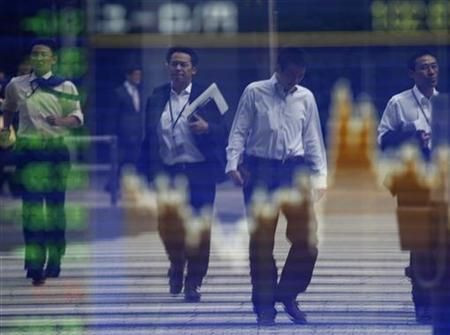German Comments, China Slowdown Drag Down Global Stocks

Asian stocks and commodities fell Tuesday after Germany's finance minister cautioned against hopes for a quick fix to Europe's debt problem, and news that China's economic growth slowed a tad in the third quarter added to concerns.
China's gross domestic product growth eased to 9.1 percent for the quarter, slightly below forecast of 9.2 percent, indicating the world's second-largest economy expanded at its slowest pace since the second quarter of 2009.
The pace of moderation has so far been measured, and today's numbers reinforce our view that a soft landing is in sight, Connie Tse, an economist at Forecast in Singapore, told Reuters.
China is also Australia's top trading partner. The Reserve Bank of Australia made clear Tuesday that it felt inflation was now less of a worry, cementing market expectations for an interest rate cut as early as next month.
Investors rushed to seek protection in the options market against losses, with the CBOE Volatility index VIX <.VIX> -- a 30-day risk forecast of volatility in the S&P 500 -- rising 18.2 percent to 33.39 on Monday, its highest one-day jump since August.
In Asian credit markets, spreads on the iTraxx Asia ex-Japan investment grade index, another gauge for whether investor risk appetite is returning, widened by about 13 basis points on Tuesday, after tightening by about 26 points over the past week on hopes of progress in Europe.
Germany's finance minister, Wolfgang Schaeuble, said on Monday that even though European governments would adopt a five-point platform to address the crisis, a definitive solution would not be reached at Sunday's European Union summit.
This came in the heels of a Group of 20 meeting of finance ministers in Paris the past weekend, which had raised expectations that European banks would be recapitalised, and the region's bailout fund expanded to deal with a potential debt default by Greece.
Although markets were not expecting the debt crisis to be resolved overnight, shares prices are likely to succumb to profit-taking after a rally, said Hiroichi Nishi, equity general manager at SMBC Nikko Securities.
MSCI's broadest index of Asia Pacific shares outside Japan <.MIAPJ0000PUS> fell 2.7 percent, with the materials sector <.MIAPJMT00PUS> in the MSCI index slumping more than 3 percent.
The Nikkei stock average <.N225> fell 1.5 percent, while Australian shares were down 1.9 percent.
World stocks, as measured by the MSCI's all-country world equity index <.MIWD00000PUS>, fell 1 percent, and U.S. stocks suffered their worst loss in two weeks on Monday, with the Dow Jones industrial average <.DJI> down 2.12 percent.
The MSCI have recovered from 15-month lows by more than 10 percent in the past nine days, on growing expectations Europe was finally accelerating efforts to resolve its debt crisis.
Don't expect a long running leg of good news. There isn't a trend right now, Colin Bradbury, Daiwa Capital Markets' regional chief strategist for Asia ex-Japan, said of the headlines news about the European debt issues.
Given that this is the fourth quarter, and very strong potential for a rebound in some stocks, investors may be tempted to lock in short-term profits to add whatever return they can get, he said.
Concerns about the euro zone sovereign debt problems hurting sentiment, a slowdown in the Asian regional growth and an expected downgrade to earnings forecasts over the next 3-6 months will likely continue to pressure the markets, he said.
Asian shares are extremely cheap, and coule spur buying and limit the downside from here, but it is currently too soon to be jumping back into high beta cyclicals, he said.
Technicals were also turning bearish, suggesting risk aversion remains.
The euro failed to breach a September high against the dollar around $1.39 on Moonday, while the Australian dollar has faced resistance at its 200-day moving average of $1.03792.
The S&P 500 also turned around from its August 31 high around 1,230.
The euro fell from a one-month high against the dollar of $1.39148 hit on Monday.
Oil was also lower, with Brent crude down 0.2 percent to $109.90 a barrel and U.S. crude futures down 0.3 percent at $86.10.
Retreating appetite for risks benefited government bonds, with 10-year U.S. Treasuries gaining 23/32 in price to yield 2.17 percent on Monday.
But other assets perceived as safe-haven such as gold were lackluster, with spot gold was nearly flat and the dollar index <.DXY> was also little changed.
(Additional reporting by Hideyuki Sano; Editing by Kavita Chandran)
© Copyright Thomson Reuters 2024. All rights reserved.





















